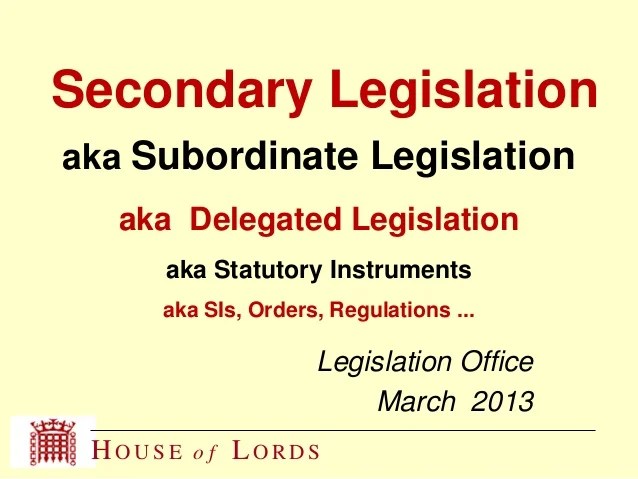Featured
- Get link
- X
- Other Apps
Examples Of Secondary Legislation
Examples Of Secondary Legislation. Delegated legislation often takes the form of a statutory instrument. An act of parliament (primary legislation) will often empower.

This means that the government can make changes to the law without. In the european union, primary. The legislation they make in this way is called ‘secondary’, ‘subordinate’ or ‘delegated’ legislation (and it often takes the form of ‘statutory instruments’).
The Renting Homes (Wales) Act 2016 (Consequential Amendments To Secondary Legislation) Regulations 2022:
Secondary legislation is also known as ‘delegated’ or ‘subordinate’ legislation and often takes the form of a statutory instrument. The binding legal instruments that make up the secondary legislation of the eu are regulations, directives and decisions. Secondary legislation can be used to set the date for when provisions of an act will come into effect as law, or to amend existing laws.
Subordinate Legislation Is Also Often Referred To As Delegated Legislation, Because The Power To Make Subordinate Legislation Is Delegated By The Enabling Act.
Eu secondary legislation falls into four categories: Generally, it is made by being signed by the. Secondary legislation is just as much the law as the act of parliament that permitted its creation.
It Publishes Reports Drawing Members' Attention To Sis.
These very basic descriptions are based upon the abc of eu law, pp. The body of law that comes from the principles and objectives of the treaties is known as secondary law; The act must say what changes can be made to it by.
For Example, Governments Often Use Secondary Legislation To Ban New Substances In Response To New Information About Their Dangers By Adding Them To A List Under The Misuse Of Drugs Act 1971.
Primary legislation is an act that has been passed by the parliament. Statutory instruments are known as secondary legislation they make changes to the law under powers that have been specified in a previous act of parliament. Secondary, or delegated, legislation is law made by a person or body other than parliament (usually government ministers), under powers delegated by a ‘parent’ act of.
For Example, The Office Of Communications (Ofcom) Is Given.
Under a power that parliament has formally delegated in a particular act. The legislation they make in this way is called ‘secondary’, ‘subordinate’ or ‘delegated’ legislation (and it often takes the form of ‘statutory instruments’). Primary legislation and secondary legislation (the latter also called delegated legislation or subordinate legislation) are two forms of law, created respectively by the legislative and.
Popular Posts
An Example Of A Two Point Violation Includes Reckless Driving
- Get link
- X
- Other Apps
Comments
Post a Comment